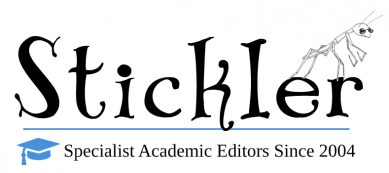How often do you walk away from your computer after a writing session feeling disappointed at having not written more? This will be familiar to any academic, but ask yourself: What did you set out to achieve in the first place? One mistake too many of us make is that we approach writing with ill-defined goals. However, the research is clear: Setting effective goals is the first step toward making tremendous accomplishments.1
Thankfully, there are plenty of methods to help you set practical goals, one of which is the SMART framework. Using this framework will help you not only keep on track but identify when a day’s work is complete. This means you can walk away from the computer feeling proud of what you have accomplished.
What does SMART stand for? The short answer is Specific, Measureable, Achievable, Relevant, Time-bound. Each of these corresponds to a strategy you can use when setting your writing goals. Below, we explore each component in the context of academic writing.
Specific
Rather than being vague, a good writing goal will make crystal clear the particular task to be completed (and how), often using numbers.
Bad example of a specific goal: “I will write some of my introduction section today.”
Good example of a specific goal: “I will write five paragraphs of my introduction, focusing on the quantity of writing. I’ll go back and edit for quality tomorrow.”
Measurable
How will you know that you are making progress toward your writing goal, and how will you know when you have achieved it? Ensuring you have quantifiable metrics against which you can benchmark your progress is essential for holding yourself accountable and knowing when it’s time to close the laptop.
Bad example of a measurable goal: “I will write up some of my discussion section today, stopping when I get tired.”
Good example of a measurable goal: “I will write 500 words of my discussion, after which I will stop writing and review my work tomorrow.”
Achievable
It’s possible that being accepted by a top-tier publication on your first submission, or drafting an entire thesis in a day, is unrealistic. Take a moment to consider whether your goals are achievable. Seek support and keep your goals manageable.
Bad example of an achievable goal: “I will finish the last chapter of my thesis before editing and proofreading the entire manuscript in time for the submission deadline. I’ll squeeze it in around the other things I have to do. Everything will be fine!”
Good example of an achievable goal: “I will take the next day to finalize the last chapter of my thesis and then send it to a professional proofreading service to get the language polished.”
Relevant
It’s much easier to work on things that feel personally relevant to you. Ask yourself—ideally before you even commence writing—whether your current writing project feels meaningful and exciting. Goals that motivate us in and of themselves, irrespective of their material rewards, are much more motivating than goals we’re pursuing purely for a paycheck.2
Bad example of a relevant goal: You see a call for proposals for an upcoming special issue. The issue is not on a topic that you find particularly interesting, but you’ve got some results that you think will fit the bill. You decide to write up a proposal but it feels like a chore. When the proposal is accepted, you dread the time you must now dedicate to writing the full manuscript.
Good example of a relevant goal: You have been offered the chance to submit a chapter to an edited book. The offer comes from a prestigious and reputable publisher, but the topic you would be writing about isn’t as interesting to you as your focal research. You decide to decline the offer and focus on your core research. Consequently, you enjoy sitting down to write much more than if you had pursued the opportunity, and are highly productive.
Time-bound
Lastly, the best goals are time-bound. Create a timeline of tasks that lead up to a final deadline, ensuring they are bite-sized and allow buffer room for any unexpected hiccups.
Bad example of a time-bound goal: “I’m going to finish that chapter of my thesis… eventually.”
Good example of a time-bound goal: “I will complete the first draft of my 3,000-word discussion section within seven days. Therefore, I will write 500 words each day up to the deadline, allowing one day for any delays.”
Consider setting yourself some SMART goals and watch as your writing productivity soars!
